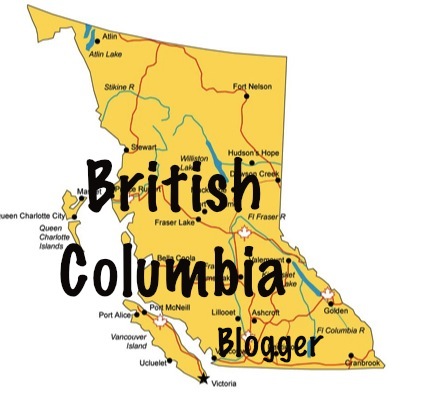Have you worked with a teacher candidate lately? In what ways did it benefit you as an educator?
|
Tomorrow afternoon I am presenting with a fellow VP to a group of teacher candidates on the topic of assessment. And you know what? I love the way it forces me stop and think. It is such a good way to reflect on my why for everything. Why do I assess the way that I do? What do I value in regards to meaningful assessment? What does it even mean to me? This is one of the amazing silver linings of putting in all the work to put together a presentation--you really have to stop and think about your why. And that is so meaningful. It is one of the reasons I love collaborating with colleagues and one of the reasons I just absolutely love working with teacher candidates (I was an FA at SFU for 3 years working with teacher candidates and LOVED it). In helping the TCs grow their knowledge I am getting to grow too! win win.
Have you worked with a teacher candidate lately? In what ways did it benefit you as an educator?
0 Comments
It has been 4 years since my last blog post, written on April 24th, 2020. My son is also almost 4 years old. I was fortunate enough to be able to take 2.5 years off when he was born and spend it at home with him. I stopped blogging then but I didn't stop writing...I started a baby journal and started writing in that instead. I am still journaling in that way but today I decided it was time to come back to my blog.
Why? I feel newly inspired!! I just switched school districts and am so excited to be the new vice principal at Talmey in Richmond (an AMAZING district--check out their strategic plan here). I had 19 wonderful years in Surrey but this new, fresh start in Richmond has re-ignited me! Totally reminds me that change is so good. Another thing that has inspired me is listening to podcasts. Since I have a bit of a commute to work, I have started listening to podcasts in the car. Today I listened to Tim Cavey interview Rose Pillay on the Teachers on Fire podcast. They talked about blogging and reflecting on our learning and it totally reminded me of how much I used to love it. So here I am. Ready to begin again. I am excited. One thing Rose said on the podcast which stayed with me was that teaching was a team sport. It totally is and I just love being able to connect with team-members on twitter, blogs, and in person!! Thank you Tim and Rose for sharing your enthusiasm--it is certainly contagious! Next post coming soon. Hi everyone! I just wanted to quickly share a new resource that Denise Krebs and I put together. This is the new rubric that we are using for Genius Hour. We hope you like it and find it useful to use with your students! FYI, I don't focus on each characteristic with each session of Genius Hour, but rather I have had students reflect on a couple at a time. But you could use all of it at once--totally up to you! You know your students best! We use the acronym G.E.N.I.U.S. H.O.U.R. to spell out these Genius Hour characteristics: Implementing Genius Hour in your classroom? Here are the 6 steps that Denise Krebs and I have laid out in the NEW 2nd edition of The Genius Hour Guidebook! We hope this helps as you implement this amazing passion/inquiry based learning in your classroom. Click here to hear Denise explain how she uses the 6 steps while teaching remotely during Covid19. [Thank you to Valentina Gonzalez (@ValentinaESL) for creating the graphic to go along with our 6 Steps]
I am so excited to share that the 2nd Edition of The Genius Hour Guidebook is now out!
In this edition, Denise and I update each chapter with new stories and new quotes from many teachers who have been implementing Genius Hour in their classrooms. We have also added a couple of new chapters based on reader feedback and have included update lesson plans and handouts. We really appreciate the support of all the readers that have used the 1st edition and we hope that you love the 2nd edition even more! Click here to purchase the book on amazon. Click here to purchase the book on routledge. As always, please keep using the #geniushour hashtag on twitter to engage with the Genius Hour community and keep the conversation going! And visit our book website, www.geniushourguide.org for more info. 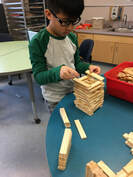 4th grade student working on building different structures with kiva blocks. He is using his creative thinking and documenting the process 4th grade student working on building different structures with kiva blocks. He is using his creative thinking and documenting the process I have been thinking about this question a lot. And not just recently, I have actually been thinking about this question for years now. When I first started doing Genius Hour with my students during the 2011-2012 school year, I didn't even think about this question. It was just a given to me that students could work on any type of project that they were passionate about. However, the more popular Genius Hour gets, the more how-to videos and lists appear online--which is awesome!! This means more and more kids around the world are getting a chance to learn more about their own interests, wonders and passions. But here is my wonder: does every Genius Hour project need to include research? Because I think that is sometimes the assumption out there--that kids pick a topic and/or question and then research (on the internet or using books/magazines from the library) and then present in some sort of way (a speech, a poster, a display for the school, a post online, etc). This is what a lot of sites/posts online seem to be saying anyway. 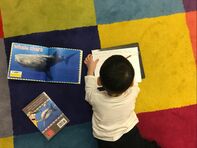 A K student doing traditional research for his Genius Hour project A K student doing traditional research for his Genius Hour project And yes, that is what many, many of my students have done in the past. But not all of them. Some don't do any "research" during their Genius Hour time. Some have used their time to create unique art projects where they explore using a variety of mediums and then share about that. Some have used their time to invent new sports and then shared an infomercial that taught the rest of the class how to play that new sport. And some have spent their time thinking up random acts of kindness initiatives because their passion was making people happy. All of these were fantastic Genius Hour projects in my eyes--but they didn't contain any traditional research--and I am totally OK with that! But after reading other people's descriptions of Genius Hour, I began to second guess what I was doing. Should I force my students to do "research" as well? I don't feel like that necessarily needs to be a part of a good Genius Hour project (because that doesn't leave room for the cool art projects, or the kid writing a book, etc, etc.) And what is research anyway? Does research have to be done with a computer or a book? What about surveying people? That is a type of research too, so would that count for people? I guess ultimately we all create our own parameters for our students. But I am really curious about what others are doing...I am happy continuing Genius Hour the way I do it now. For me, it is important that the students truly be able to do what they are passionate about, and if that is a compassion-based project that has no research then I am super thrilled! No need for traditional research in every project, in my opinion. But if as student wants to do a research project then that is great too! I am happy with all projects. What do you think? Does every Genius Hour project need to include traditional research? "Identity day is a day where you bring in a few items to school that showcase your passion. Then the school splits up into 2 groups. The 1st group stays while the second group walks around and learns about your passion! It is really, really fun!" -Addison, Grade 6 November 21, 2018 was my first experience with Identity Day. I have read about versions of this sort of special sharing day online and I have always wanted to see it in action, so I was thrilled when I got to Brookside Elementary (I just started as a grade 4-7 classroom STEAM teacher in the SAIL program and vice principal there in September, 2018) and learned that Identity Day was an annual event at my new school. In the quote above, Addison has summarized nicely how we do Identity Day at Brookside Elementary. Basically we divide up the school into an A group and a B group and then group B gets to explore group A's identity day projects in a gallery walk format and then after an hour we switched and group A got to explore group B's projects*. What your Identity Day project looked like was primarily up to each student. We asked them to bring in an artifact or two that represented who they are/what they were passionate about. Some students also created posters to go along with their artifacts, some created special displays, some rehearsed mini-speeches to go along with their artifacts, etc. I really enjoyed learning about all of the students at Brookside. It was a wonderful way for me, as a new staff member, to learn all about the many interesting and varied passions that makes Brookside students who they are. One project that really stood out was by a grade 7 student. Her passion was self-love and helping others develop a positive self-image, and as her artifact she brought a mirror attached to a poster and a pile of positive mantra statements on little pieces of paper. As students visited her station, she had them pick a mantra and then read it to themselves while looking at their reflection in the mirror. The caption above the mirror reads: "Look into the mirror. Think about a feature you appreciate about yourself." Are you feeling what I was feeling? So. Amazing. There were so many great projects that I cannot list them all, but I did learn that we sure do have a talented bunch of students at our school: artists, musicians, athletes, scientists, book enthusiasts, lego enthusiasts, singers, engineers, and more! I am so thrilled that I was able to join a school that values each and every student and allows them the space and the time to share who they are with all of their schoolmate. It was such a special day. I would love to hear about how other schools roll out Identity Day. Or do you something similar to celebrate your students? Please comment! I would love to learn from you. *It was a little more structured than that, of course. Classes explored other classes on a timed rotation. We rang the bell every 10 minutes so your class knew that it was time to go to the next class and explore another set of projects. Teachers had the rotation schedule and map ahead of time so everyone knew where they were going. Parents were given the schedule ahead of time so that they could join us during the exploration times as well.
I wrote a blog post about my thoughts on spelling many years ago. It was 2013 and I was teaching a grade 5/6 class. I never published the blog because I felt like it was too short and wasn't quite finished. And so it sat in my drafts for 5 years. I think it is time to push publish. I didn't add anything. I left it the way it was, so it is still short and maybe not quite finished...but as I tell my students, sometimes done is better than perfect. So, here it is. What do you think about spelling programs? From 2013:
Spelling. I am getting tired of teaching spelling…I have tried it the old fashioned Steck Vaughn way with lists of words and worksheets, I have also tried the newer Words Their Way program where words are sorted by patterns and students make lists and organize words by patterns…I am bored by both. And If I am bored I can only imagine that my students are bored too…like really bored. So the other day I said that if you don’t want to do spelling sentences for homework this week, then you don’t have to, they look at me wide-eyed and hopeful. Instead, I said, you can cook. Cook something for your family and show my some evidence of it by Friday…you can journal about it and have your parent sign it or you can take pictures of yourself cooking...make a movie…whatever you want. And if you don’t want to cook, then thats ok too, you can still do spelling sentences. The next day I was surprised by how many students brought their cameras and tablets into school to show my their photo and video evidence, as well as a few written paragraphs about what they cooked. My heart warmed. They were spending time with their families, having a good time in the kitchen, learning how to cook and using their oral language skills to have real conversations. I can't help but think this is more authentic and more meaningful learning than the spelling we were doing before. I love it. And I am going to have figure out another way to teach spelling/vocabulary. Perhaps. Or maybe not. Maybe it doesn't need to be a separate program. Do you teach spelling? If so, how do you do it? I would love to hear from other elementary teachers about this! In March of 2012, Denise Krebs and I co-hosted our very first #geniushour chat on twitter. I was so nervous. I didn’t know if anyone would show up...but they did! Since then we have had 67 chats over the past 6 years. Those chats are amazing! So many people join in now, from all over the world, to share their genius hour successes, advice, and to ask the group for advice. We have had amazing guest hosts and have covered a wide variety of Genius Hour related topics. Our chats on the first Thursday of each month at 6 pm pacific/9 pm eastern. Currently all of our archives are on our wiki: geniushour.wikispaces.com. Unfortunately all of that data is about to be deleted, as wikispaces and storify (the program we used for most of the archives) are both shutting down. So Denise and I are trying our best to re-archive and post about some of those 67 chats. We don’t have time to re-archive all of them as it is a lengthy process but we are working on it over the next couple of weeks. So where are all these old archives going? And where will the new ones go? We have a new tab on our book site: geniushourguide.org for all things related to the monthly #geniushour chat. As of August 1, 2018 the wiki will be shut down and everything will be on geniushourguide.org. For a teeny bit longer you can look at all of the old archives on the wiki. It feels like the end of an era. Geniushour.wikispaces.com was the internet’s very first website devoted to Genius Hour. Now there are so many. Which is great, but I am sad to lose all of the work we put into the original wiki. We will try to save what we can. Did you have a favourite chat over the years? Let me know and I will try to make sure we re-archive that one!
As a vice principal, I have the wonderful opportunity to spend time in many different classes over the school year and I always find it so exciting to see what folks are doing with their students! Of course I get especially excited when teachers invite me into their classrooms to participate during Genius Hour. Last year (the 2016-17 school year) I had several different teachers ask me to join in during Genius Hour and it was great to see how they all approached it in slightly different ways. The overall structure was similar in each room: students were given time to brainstorm lists of things they were interested in, passionate about, cared about, etc and then students designed a project around one of these topics starting with an inquiry question that they would pursue. Students were then given the opportunity to share their learning in a way that they chose–a fairly typical Genius Hour structure. Good stuff!
However, one teacher structured it a bit differently. Before introducing the concept of Genius Hour to her class, she noticed that students really wanted the opportunity to become the teacher and teach the class themselves. And so, in order to be responsive to this authentic enthusiasm in her class, she introduced Genius Hour and asked them to prepare a lesson at the end. She told them they would all get to be teacher! This is what they had been begging for! So, we introduced Genius Hour in the same way as the other classes (following these steps). But she added that at the end they would have the opportunity to teach something to the rest of the class as part of their project. Students in her grade 4/5 class were very excited about this presentation format. They were thrilled to plan lessons and teach their peers a new skill, some new information, etc. So, why am I writing about this now? I was recently perusing an article by Parker Palmer and was struck again by one of his famous quotes, “good teaching cannot be reduced to technique; good teaching comes from the identity and integrity of the teacher”, and was reminded once again, how there cannot be one prescribed way to do Genius Hour. Like Denise Krebs and I state in our book, you have to make it your own and do what works for you. I love that this teacher was in tune with what her students wanted to do and made that connection to what she wanted to do–Genius Hour. It was a win-win for everyone. And I was thrilled to be able to support the learning in her classroom-so a win for me too. |
AuthorMy name is Gallit Zvi and I am an Elementary School Teacher and Vice Principal in Surrey, BC. I am also a blogger and co-author of The Genius Hour Guidebook. Archives
April 2020
Categories
All
|
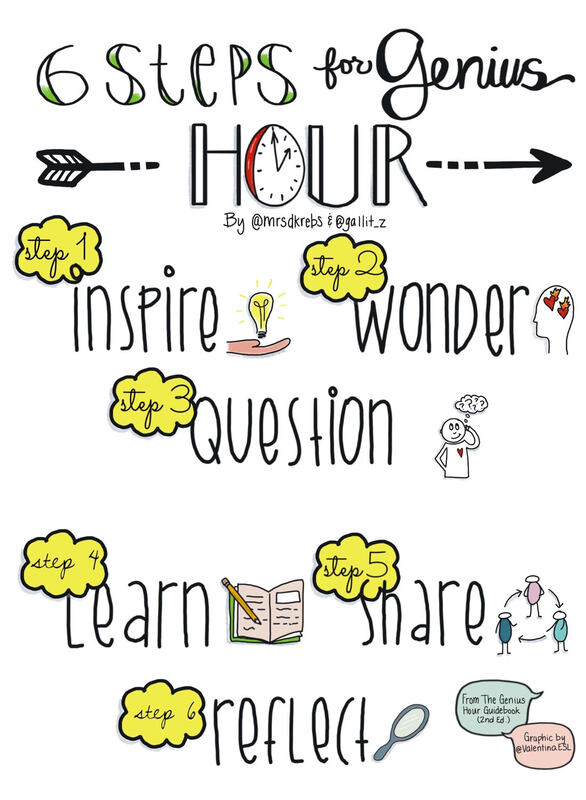
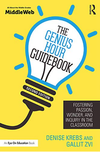
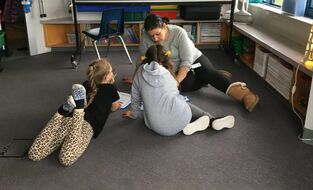
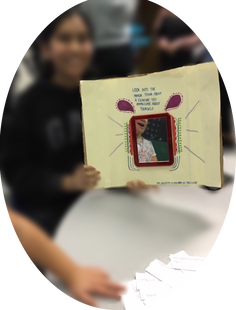
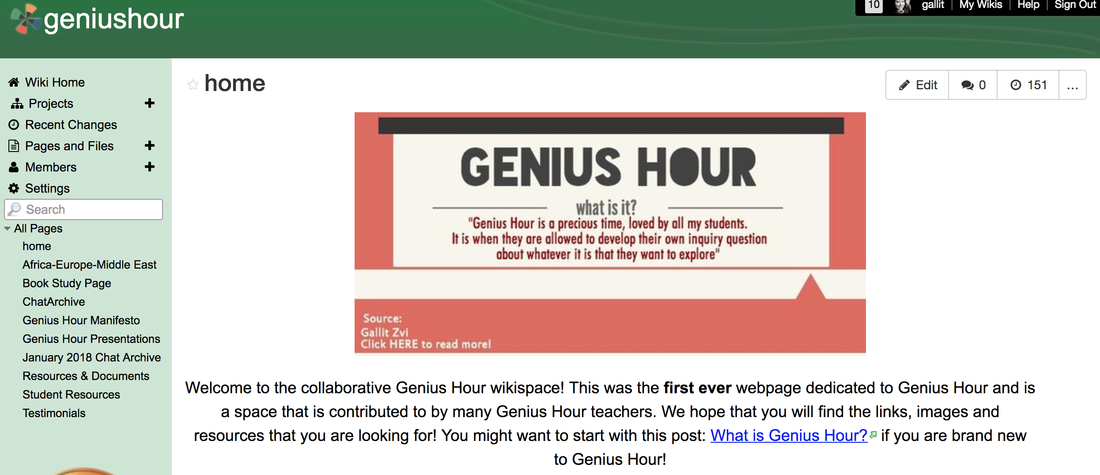

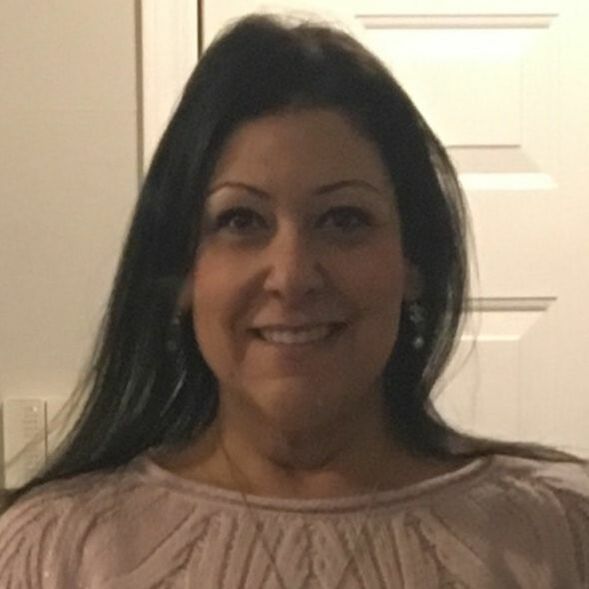
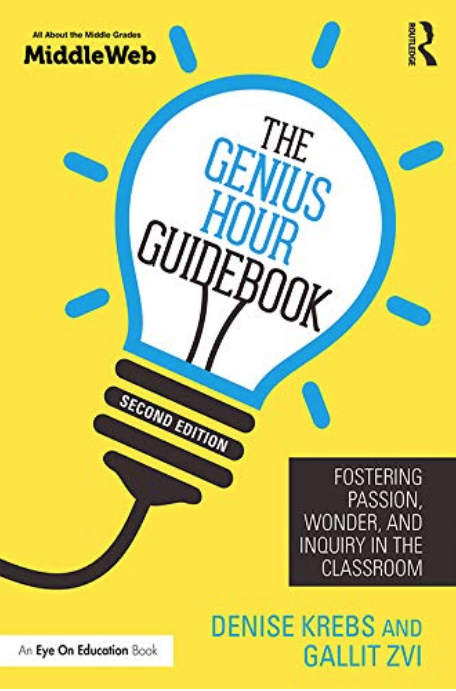
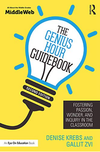
 RSS Feed
RSS Feed
